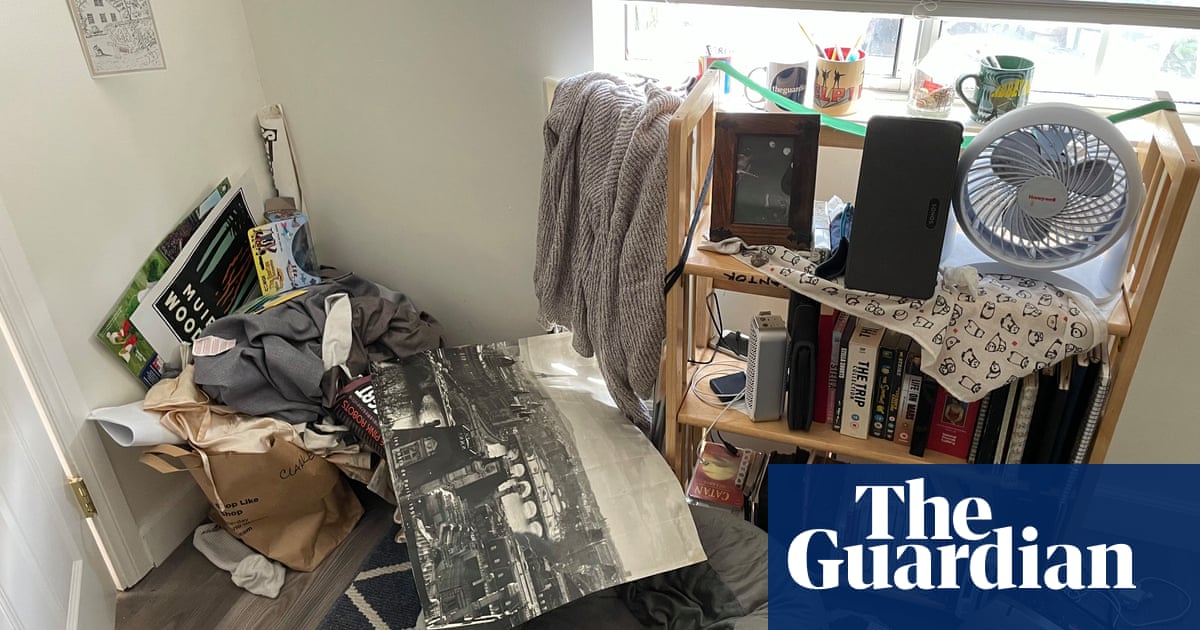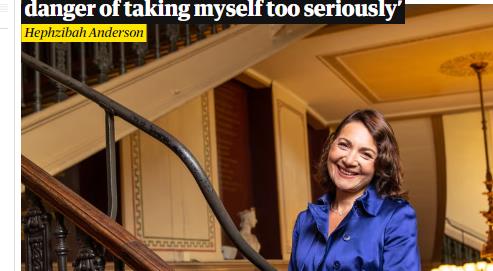
As long as there has been standup, comics have had to decide how to be themselves on stage. But now, a generation has emerged who – thanks to social media – have been performing in public, even while establishing their actual identities, since adolescence. The fallout from that process is spawning much of today’s best comedy, Catherine Cohen’s very much included. Cohen’s maiden set The Twist …? She’s Gorgeous was the standout show of 2019, on which she was all set to capitalise when the global pandemic struck. Now she is back, with a show that should reveal what the self-obsessed comedy of an Insta-addled twentysomething looks like when its creator inches into their 30s.
The answer – spoiler alert! – is that Cohen, now 31, still has “the same bravado and obsession with myself and with glamour at all costs”. Such are the qualities she brought three summers ago from New York City, where she was known for her weekly cabaret slot at Alan Cumming’s Manhattan nightclub, to the Edinburgh fringe – from which she sashayed off with a slam-dunk best newcomer prize. I met her at the time, and in conversation she was playful and highly self-aware, invisible air quotes lingering around her every utterance. Great fun, in other words – if not as much fun as that debut show, The Twist …, a performance with so much star power it left scorch marks.
It found the Houston, Texas native dolled up in sequins, accompanied on piano by musical comedian Henry Koperski, performing a suite of songs about sex, body image, and the tensions between carefully curated confidence and the ravening neurosis beneath. With its signature track Look at Me, a phrase repeated ad absurdum throughout, the show was catchy, silly, hyper self-involved, and shockingly oversharey. Throughout, Cohen’s Dorothy Parker meets Kim Kardashian sensibility served up joke (“I love sex because it famously has no consequences”) after joke (“I famously love porn if my boyfriend tells me the girl looks like me. But otherwise it is Bad! For! Women!”).
What is exciting about the performance, and about much of the comedy of Cohen’s kindred spirits (Bo Burnham, Kate Berlant, the young Londoner Leo Reich), is that it’s both satire and cry for help. So is Cohen depicting her “real” self on stage or a monstrous parody? “I don’t really think of it as a persona,” says Cohen, Zooming from Los Angeles, a little more grounded than when we first met. “It’s just me, amplified. I mean, there’s definitely a difference [between her real-world and stage selves]. But everything I say on stage is true. It just might be true things that I wouldn’t say in polite conversation.”
You can watch Cohen’s work for therapy: “My favourite thing,” she says, “is to make someone in the audience feel less crazy for feeling all their feelings.” Or you can recoil from the untamed id on display. “Look, I find myself quite annoying, too,” says Cohen. “I don’t want to be myself all the time. So I hear that criticism.”
All of which makes it rather alarming when Cohen describes her new show, Come for Me, as “a bit darker” than its predecessor. Really?! The Twist … was surely dark enough? “I guess it was. But when I look back, I’m like: child’s play!”
The Covid pandemic scotched Cohen’s onward plans for that first show, diverting her sky-rocketing career trajectory. Not that she was idle under lockdown: she hosted a weekly show on Instagram Live; she released a book of poetry (sample lyric: “We’re out of toilet paper and I just ordered / A bejeweled headband online / It’s coming Friday is it sexy / How much I hate being alone?”); she co-hosted, and still does, the hit podcast Seek Treatment (about “boys, sex, dating and love”) with Pat Regan, standup and writer on the hit comedy Hacks. Cohen was also embroiled in controversy in 2020 when a five-year-old sketch was excavated in which, to make a satirical point about performative woke activism, she held a rope around the neck of her friend, the Black performer Chris Murphy. Nuance was lost in the Twitterstorm. Her self-abasing apology duly followed.
It was not until March of this year that The Twist … made it to Netflix, the upstream to which all modern standups hope to swim. “I was terrified having to perform it,” says Cohen, “after two years of not performing at all. But on the day I was like: ‘Let’s fucking do this!’ I could not have been more ready. The taping was the best day of my life.” Its delay, though, meant that a set Cohen describes as “very of my 20s” was recorded for posterity in her 30s, its jokes and psycho-social commentary a few years past peak currency.
“You’re left wanting,” wrote one observer, “the show put on by this Cat Cohen, this more recent one.” Which is lucky – because Cohen was by then developing her follow-up, which tours the UK from February having previewed at the Edinburgh fringe. Finally, she says, her time in Covid limbo is over. She’s currently filming her biggest TV role yet, an adaptation of TV writer Kristin Newman’s memoir What I Was Doing While You Were Breeding. “It’s so cheesy, but I do feel so much more grateful now,” she says. “Every show I get to do, every shoot I’m on, I’m like: I cannot believe this is my life.”
Edinburgh 2022 in particular felt like a turning point. “I was just in a room, no masks, having fun, feeling like my old self again. But with no fear of death and a larger understanding of,” – cue kitschy voice – “the frailty of life. All of a sudden I was like: ‘Oh this is what I’ve been waiting for!’ This sense of community and excitement and feeling busy and full of life.”
In stark contrast, Come for Me documents the fraught side of being Catherine Cohen. “It’s dealing with existential dread,” she says. “Being a real adult. The idea of settling down, marriage and motherhood – and how terrified of that I am.” In real life? “Yeah. Sometimes it feels nice and sometimes I feel angry that I’m expected to do any of that.” By whom? “By society. And by myself; all the things I’ve been instilled with. I froze my eggs, so I talk about that in the show.”
With audiences after the curtain falls, says Cohen, she’s having “intense conversations about, like, the demands of being a woman in the world and saying goodbye to [your youth]. Your 30s is still young,” she admits, “but it’s different from your 20s, when you can fuck up again and again and you’re just doing your thing. Now it’s like: ‘Oh, there’s consequences’.”
One consequence may be that no-holds-barred comedy is a trickier thing to pull off. Cohen is in a long-term relationship now, with the actor Brian Muller. “There’s a love song in the show,” she says. “It’s about what happens when you are happy and still feel like you need more”. Such circumstances aren’t always conducive to public oversharing.
“Contrary to popular belief,” says Cohen, “I’m not a complete monster. Sometimes I’ll check with my boyfriend: ‘Is it OK if I talk about this?’ And thankfully he knows what he’s signed up for. Everything in the first show felt safely in the past when I was writing about it. Whereas now there are things that are happening in real time – and not just boyfriend things – and I’m like: this isn’t really funny yet, is it?”
None of which means that Cohen, the ne plus ultra of millennial angst and ego, is mellowing with age, although she will admit to having written one song for the new show that “veers earnest”. Cohen’s pre-Covid self would have cringed at the thought. “I think you’re right,” says Cohen, a rueful smile at the thought. “I know. Growth? How cliche!” She rolls her eyes. “I’m a walking cliche.”












